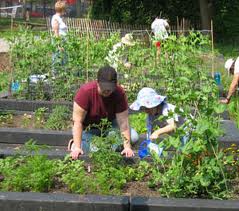Community Gardens are not new. Many San Francisco community gardens have been around since the ’60s, and Chicago’s oldest (Rainbow Park Victory Garden) was established during the Second World War! While you might have seen some of the over 40 community gardens in San Francisco , over 30 in Seattle and over 50 in Chicago, others may be harder to find. For help locating community gardens throughout the country, head here! Believe it or not, you can also locate many community gardens on Yelp – with ratings, of course!
This past weekend, Bibby was introduced to the beautiful community garden at Fort Mason in San Francisco. Established in the 1970s, this community garden is one of the more formal groups. Garden members pay dues (not unlike most I’ve come across), but those dedicated souls on the wait list do as well. Members meet every Saturday to care for the garden, and Sunday sessions are available for those who cannot make it Saturday. Be sure to keep part of your weekend clear – missing a weekend meeting results in a $20 charge! This helps ensure that members genuinely want to be involved. And they do.
 Community gardens provide members with a new way to meet neighbors, bond over common interests and get as close to nature as one can get in a city. It’s no wonder why some community gardens have wait lists that span several years into the future! The cute Potrero Hill community garden displays a wait list of 87 people as of February 1, 2010. San Francisco’s Dearborn Garden (between 17th and 18th, and Valencia and Guerrero) even had a wait of 7 years before they decided to do away with the list.
Community gardens provide members with a new way to meet neighbors, bond over common interests and get as close to nature as one can get in a city. It’s no wonder why some community gardens have wait lists that span several years into the future! The cute Potrero Hill community garden displays a wait list of 87 people as of February 1, 2010. San Francisco’s Dearborn Garden (between 17th and 18th, and Valencia and Guerrero) even had a wait of 7 years before they decided to do away with the list.
Want another option? Check out the San Francisco Green School Alliance (SFGSA), a regional support network for school communities working to transform their schoolyards into vibrant outdoor classrooms and thriving ecosystems. Yet another option for San Franciscans is the Alemany Farm, which has regular community workdays on the 1st and 3rd Sundays of every month, the Saturdays in between (usually the 2nd and 4th Saturdays), and every Monday afternoon. They’re always looking for volunteers! For help locating organizations for Urban Agriculture throughout the country, go here.
 Not all gardens are the same. Chicago’s community gardens have quite a range of uses and specialties. Though most neighborhood gardens are found within Chicago’s parks, the unique Neighbors’ Garden, in the Logan Square neighborhood, takes up the entire park. The Wicker Park community garden is known not only for its gardening, but also for its fundraising efforts and programs for kids. The Harvest Garden program, started in 2000, gives children a three season in-depth experience with organic vegetable gardening. The program now operates at 16 parks throughout the city! For more information on Chicago’s community gardens, check out this web page.
Not all gardens are the same. Chicago’s community gardens have quite a range of uses and specialties. Though most neighborhood gardens are found within Chicago’s parks, the unique Neighbors’ Garden, in the Logan Square neighborhood, takes up the entire park. The Wicker Park community garden is known not only for its gardening, but also for its fundraising efforts and programs for kids. The Harvest Garden program, started in 2000, gives children a three season in-depth experience with organic vegetable gardening. The program now operates at 16 parks throughout the city! For more information on Chicago’s community gardens, check out this web page.
In Seattle, community gardens managed by the Seattle Department of Neighborhoods are called P-Patches, under the P-Patch Community Gardening Program. The name originated from its first community garden, Picardo Farm. Thanks to non-profit organizations like Solid Ground, gardeners at P-Patch community gardens donate more than 25,000 pounds of fruits and vegetables to over two dozen providers each year. According to its website, one of Solid Ground’s programs, Lettuce Link, partners with the Department of Neighborhoods P-Patch program to encourage and support Seattle gardeners in growing extra produce for Seattle food banks, meals programs and shelters. Nicely done, community gardeners!
Want to try Urban Gardening for yourself? Amazing resources include the How to Homestead website (complete with videos) and this book, suitably titled, “Apartment Gardening”! Feel free to share your own gardening photos wth us on Facebook , and Happy Gardening!

; ?>/img/parties-that-cook-blog-logo.jpg)

